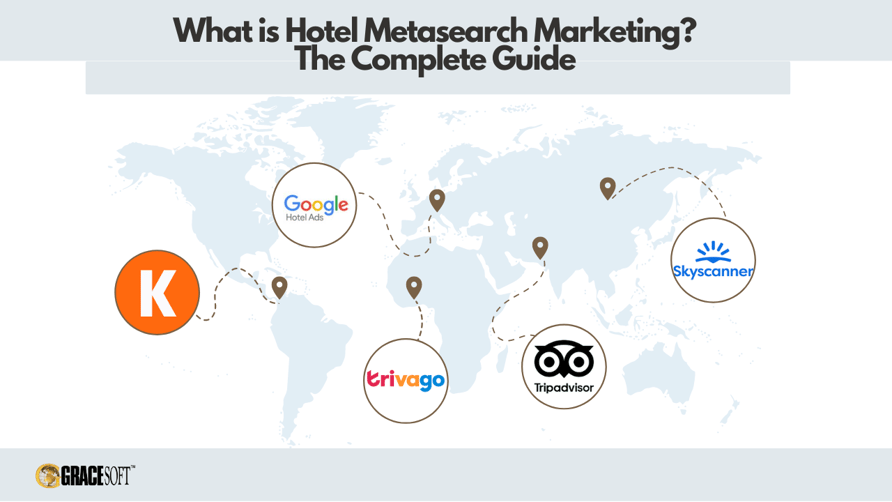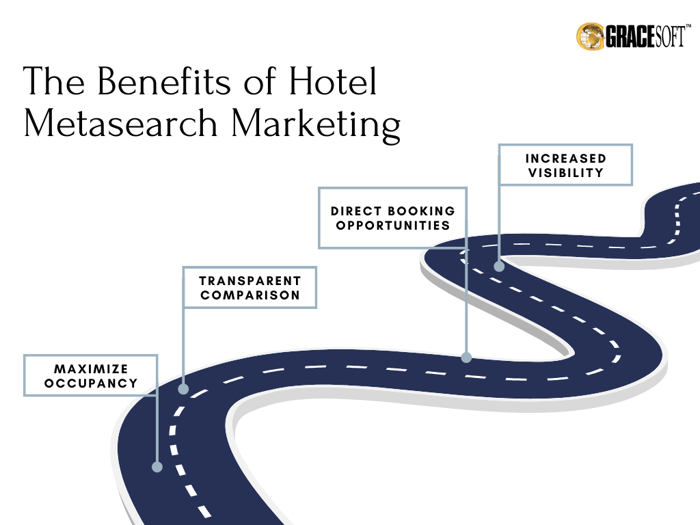Hotel Meta Search Engine Marketing: Boost Your Bookings | GraceSoft

Importance of Online Travel Booking
Online travel booking has revolutionized the hotel industry for both travelers and hotels themselves. Here's why it's important:
For Hotels:
- Increased Reach: Attract potential guests from all over the world.
- Reduced Costs: Cut out intermediaries and reduce marketing expenses.
- 24/7 Availability: Accept bookings at all times, even outside of regular business hours.
- Direct Guest Communication: Build relationships and collect valuable feedback from guests.
For Travelers:
- Convenience: Search and compare hotels from around the world in minutes, anytime.
- Wider Choice: Access a vast selection of hotels, including unique properties not found elsewhere.
- Competitive Prices: Compare rates and find deals from multiple providers.
- Transparency: Read reviews, see photos, and get detailed information before booking.
What is the Difference Between Metasearch and OTA?
If you're planning a trip and looking for a hotel, you may come across two options:
Online Travel Agencies (OTAs) like Expedia or Booking.com, and Metasearch Engines like Kayak or Google Hotels.
OTAs act as middlemen, offering their own inventory of hotel rooms at specific rates. You can book directly through them.
On the other hand, Metasearch Engines do not sell rooms themselves. They compare the rates, amenities, and details of various hotels from different sources like OTAs, hotel websites, etc., and display them in one place. This comparison allows you to easily compare options before clicking through to book directly with the provider.
Here's the key difference:
- Online travel agencies (OTAs) have control over the booking process. When you book through their platform, they receive a commission from the hotel.
- Metasearch engines simply facilitate the process by showing you the available options. However, they don't handle the booking itself. To complete the reservation, you need to click through to the hotel's website or OTA.
The Benefits of Hotel Metasearch Marketing

Increased Visibility:Listing your property on metasearch engines expands your reach beyond your local market, attracting travelers who are actively researching and comparing hotels.
Direct Booking Opportunities:When travelers discover your hotel via a metasearch engine and then proceed to click through to book, there is a higher likelihood that they will make their reservation directly on your hotel's website instead of through an OTA. This enables you to avoid paying OTA commission fees and retain a greater portion of the revenue from each booking.
Transparent Comparison:Travelers can easily compare prices, reviews, and amenities across multiple hotels for transparent and informed decision-making.
Maximize Occupancy:Metasearch helps target travelers looking for specific dates or last-minute deals, especially during off-peak periods or weekdays with empty rooms. With targeted campaigns, you can attract potential guests and increase occupancy rates and revenue.
How Metasearch Engines Work for Hotels
Metasearch engines have revolutionized hotel booking by providing a hassle-free approach for comparing prices and finding the most attractive deals. However, what sets them apart from traditional booking platforms, and how do they work? The following is a comprehensive explanation of the mechanism behind metasearch engines:
Metasearch engines don't hold any hotels themselves. Instead, they act as aggregators, reaching out to various sources for information.
- Online Travel Agencies (OTAs): Familiar names like Expedia, Booking.com, etc.
- Hotel Chain Websites: Hilton, Marriott, etc.
- Independent Hotel Websites: Individual properties with their own booking systems
1. Data Collection:metasearch engines request specific hotel data from these sources through automated queries.
- Availability: Are rooms available for the requested dates?
- Rates: Hilton, Marriott, etc.
- Amenities: What facilities and services does the hotel offer?
- Other details: Photos, reviews, cancellation policies, etc.
2. Data Standardization: After collecting data, metasearch engines standardize it to ensure consistency and present it uniformly. This includes normalizing room types, amenities, and policies across different sources.
3. Ranking and Display: Each metasearch engine has its own ranking algorithm, similar to how Google ranks websites. This algorithm considers factors like:
- Hotel star rating: A higher star rating generally indicates a higher quality hotel.
- Guest reviews: Positive reviews can significantly boost a hotel's ranking.
- Price: Competitive pricing can make a hotel more appealing to users.
- Special offers: Discounts and promotions can elevate a hotel's position in the results.
4. Direct Booking and Redirects:
- Some metasearch engines offer direct booking options, allowing users to complete their reservations without leaving the platform. In this case, users can click on the preferred option, and the metasearch engine redirects them to the hotel or OTA's booking page.
- In other instances, users may be redirected to the hotel or OTA website to complete the booking process.
5. Cost-Per-Click (CPC) Model:
- Metasearch engines operate on a CPC model where hotels and OTAs bid for ad placements and are charged a fee for each click. This bidding system creates a competitive marketplace.
Metasearch engines are powerful aggregators that gather and organize hotel data from various sources. They provide a convenient tool for travelers to compare hotels and find the best deals, while also increasing the visibility of hotels to a wider audience.
Most Popular Hotel Metasearch Platforms in 2024
Google Hotels Ads: Previously known as Google Hotel Finder, this platform integrates seamlessly with Google Search and Google Maps, making it highly visible to travelers searching for hotels online.
Tripadvisor: Although not a metasearch engine exclusively, TripAdvisor empowers travelers by providing them with the ability to compare prices from various sources as well as user reviews and ratings.
Trivago: This platform enables users to compare hotel prices from various OTAs and find the best deals.
Kayak: Similar to Trivago, Kayak aggregates hotel deals from various sources and allows users to filter and compare options based on their needs.
SkyScanner: Primarily known for flight searches, Skyscanner also offers a hotel search feature that aggregates deals from various sources and allows users to compare prices and book directly with the provider.
HotelsCombined: This platform is dedicated to comparing hotel prices from various sources, helping users find the best deal for their desired hotel.
These are just a few of the many popular hotel metasearch platforms available. The best platform for you will depend on your individual needs and preferences.
How Hotels Advertise on Metasearch Platforms (Pay-Per-Click)
Metasearch engines do not have their own inventory, so hotels rely on advertising to stand out and attract guests. The most common advertising model is pay-per-click (PPC).
1. Bidding for Visibility: On metasearch platforms, hotels have the ability to create advertising campaigns by setting a maximum bid for each click on their ads. This bid amount is important in determining the position of the ad in the search results.
2. Targeting the Right Audience: Most platforms offer targeting options to ensure your ads reach the right travelers. You can target based on:
- Location: Focus on travelers searching for hotels in your area.
- Dates: Target ads to specific travel dates with high demand.
- Guest type: Tailor your ads to attract business travelers, families, or leisure travelers.
- Budget: Set a daily or campaign budget to control your advertising spend.
3. The Auction Process: When a traveler searches for hotels, a real-time auction happens behind the scenes. Here's what's considered:
- Your Bid: The higher your bid, the more likely your ad is to be shown.
- Hotel Ranking: Factors like star rating, reviews, and amenities can influence your position.
- Relevancy: How well your ad matches the traveler's search criteria plays a part.
4. You Only Pay When Clicked With PPC, you only pay when a traveler clicks on your ad and is directed to your website or booking platform (OTA or hotel website).
5. Optimizing for Success Metasearch platforms provide reporting tools for your campaigns. These tools allow you to monitor important metrics such as impressions (the number of times your ad was viewed), clicks, and conversions (bookings made through your ad). By analyzing this data, you can improve your return on investment (ROI) by optimizing your bids, targeting your audience, and refining your ad content.
Benefits of PPC for Hotels:
- Targeted Reach: Attract travelers actively searching for hotels that meet your criteria.
- Increased Visibility: Stand out from competitors and grab attention on a highly visible platform.
- Measurable Results: Track the effectiveness of your campaigns and optimize for better results.
- Cost-Effective: Only pay when potential guests click on your ad.
By leveraging PPC advertising on metasearch platforms, hotels can effectively capture the attention of travelers who are already interested in booking, leading to increased website traffic, direct bookings, and ultimately, higher revenue.
You May Also Like
These Related Stories

How to make the best of Expedia and Booking.com
Manage Online Hotel Bookings on Your Phone | GraceSoft

.webp?width=128&height=64&name=gracesoft%20logo%20copy%20(7).webp)

No Comments Yet
Let us know what you think